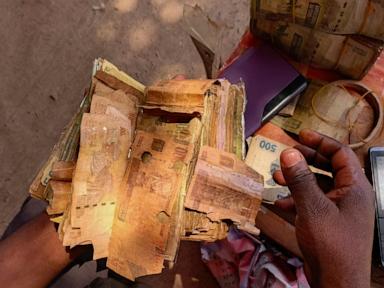Bukavu Residents Struggle with Defective Banknotes Amid Cash Shortage

In the eastern Congolese city of Bukavu, residents are grappling with a severe cash shortage that has forced many to use damaged banknotes. The situation has arisen following the takeover of the city by the Rwanda-backed M23 rebel group in February 2024, which intensified fighting between insurgents and Congolese forces.
Alain Mukumiro, a local resident, expressed his frustration after a shopkeeper refused to accept his older, hole-punched banknotes. “All my money has serial numbers, but they refuse it,” he lamented. Mukumiro’s family, like many others in Bukavu, faces the grim prospect of another night without food. The city, the capital of South Kivu province, has been without functioning banks since the conflict escalated, leading to a critical shortage of cash.
The damaged notes in circulation are believed to be older bills intended for destruction. Residents suspect they may have been stolen during the M23’s takeover. According to Ruboneka Mirindi Innocent, a local money-changer, these older notes are exchanged at a rate of approximately 10-to-1 against new bills. “We keep these banknotes because we don’t know what else to do; it’s just to help each other out,” he explained.
The ongoing conflict has exacerbated an already dire humanitarian crisis, displacing around 7 million people in the region and increasing the number of towns controlled by the rebels. The closure of banks in Bukavu and nearby cities, such as Goma, has severely impacted residents’ ability to access cash, further complicating daily life in what was once a thriving economic area.
The simultaneous use of both intact and damaged banknotes has created confusion and tension among businesses and customers. Mukumiro described the situation as a “real headache,” noting that some vendors accept the defective notes while others do not. As a refrigerator technician and father of three, he finds himself running out of options as businesses increasingly decline the only form of currency he possesses.
Zihalirwa Rutchababisha, a local business owner, also refrains from accepting the defective banknotes to avoid potential losses. “If I take them, I won’t be able to use them to purchase supplies, and that would put me at a loss,” he stated. His weekly profit has decreased from $120 last year to just $20 due to declining sales linked to the ongoing unrest.
In the rebel-held areas, some state employees, who previously received cash payments, have transitioned to online transfers. This adjustment benefits only a small fraction of the population, as they represent merely 2% of Bukavu’s over 1.3 million residents. Most locals still rely on cash transactions, primarily within the informal economy.
David Kyanga, an economics professor at Bukavu’s Higher Institute of Commerce, emphasized the need for the M23 to recognize the defective banknotes as valid currency, alleviating tensions in the absence of new cash supplies from the Congolese banking authorities. He suggested that clear communication from the M23 could help stabilize the situation.
Recently, Patrick Busu Bwasingwi Nshombo, the M23-appointed governor of South Kivu province, encouraged residents to exchange their damaged notes at a bank opened by the rebels. However, the operation was halted shortly after due to an overwhelming volume of banknotes brought in for exchange.
Patrick Muyaya, the Congolese government spokesperson, reiterated that authorities would not send new banknotes or reopen banks in regions controlled by the M23. He stated, “No bank can open its doors in a situation of insecurity like what is happening in areas occupied by the M23,” highlighting the challenges of maintaining order and financial stability.
As the situation unfolds, local residents like Mukumiro continue to express their despair. “We don’t know who will save us,” he stated, noting the lack of support from both the government in Kinshasa and the M23. The ongoing crisis in Bukavu illustrates the significant and urgent need for a resolution in a region already plagued by prolonged instability.






